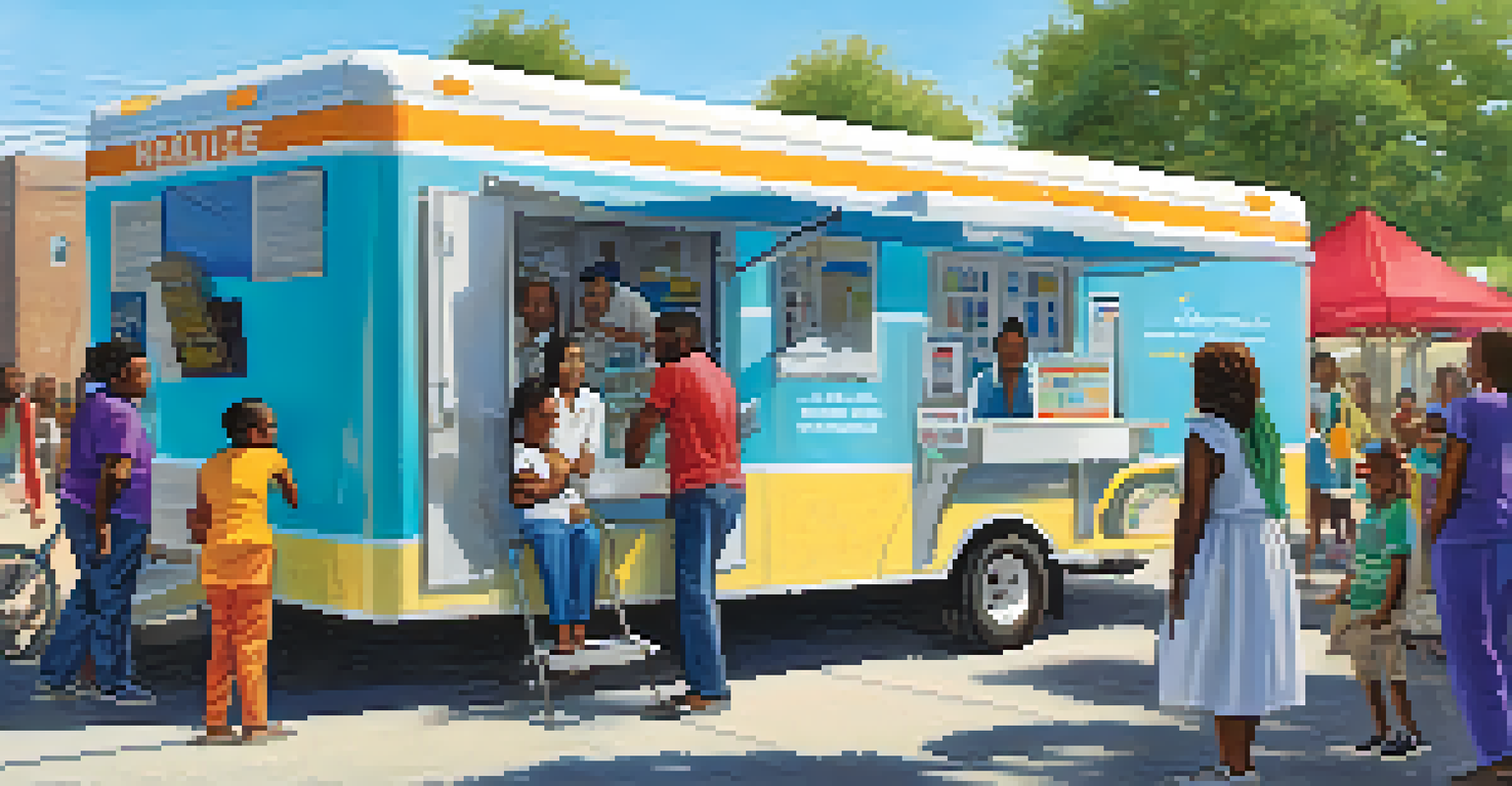Access to Healthcare: A Key Factor in Addiction Recovery

Understanding Addiction and Its Complex Challenges
Addiction is a multifaceted issue that affects individuals physically, mentally, and emotionally. It’s not just about the substance; it involves a web of factors including genetics, environment, and mental health. Recognizing that addiction is a disease helps to destigmatize it, allowing for a more compassionate approach to recovery.
Addiction is a family disease. One person may be the one with the addiction, but the whole family suffers.
Many people struggling with addiction also face co-occurring mental health disorders, such as anxiety or depression. This dual diagnosis complicates treatment, making access to comprehensive healthcare crucial. Without the right support, individuals may find it difficult to navigate their recovery journey successfully.
Furthermore, the societal stigma surrounding addiction can deter individuals from seeking help. This stigma often leads to feelings of shame and isolation, making access to healthcare even more critical. Understanding these challenges is the first step in addressing the broader issue of addiction recovery.
The Role of Accessible Healthcare in Recovery
Access to healthcare services is a fundamental aspect of the recovery process. When individuals can easily access medical and psychological support, they are more likely to engage in treatment programs. This accessibility can include anything from outpatient therapy to medication-assisted treatment, which can significantly improve recovery outcomes.

Healthcare access also provides opportunities for preventative care, which can reduce the risk of relapse. Regular check-ups and support groups can help individuals stay on track and feel connected to a community. This consistent support system is essential for maintaining long-term sobriety.
Addiction is a Complex Disease
Understanding addiction as a multifaceted disease helps destigmatize it and promotes a compassionate approach to recovery.
Moreover, when healthcare services are affordable and available, it removes barriers that prevent individuals from seeking help. Financial strain can lead many to abandon treatment altogether, so ensuring that services are within reach is vital for fostering recovery. This leads to healthier communities and reduces the societal costs associated with addiction.
Barriers to Accessing Healthcare Services
Despite the importance of healthcare access, many individuals face significant barriers. These can include financial constraints, lack of insurance, or limited availability of services in their area. Rural communities, in particular, may struggle to find adequate resources, leading to a gap in care.
Recovery is not a race. You don’t have to feel guilty if it takes you longer than you expected.
Additionally, cultural and language barriers can further complicate access to healthcare. Individuals from diverse backgrounds may find it difficult to communicate their needs or may not feel culturally comfortable in traditional healthcare settings. Addressing these barriers is crucial for creating an inclusive environment where everyone feels welcome to seek help.
Transportation issues also play a significant role; if individuals cannot easily reach healthcare facilities, they are less likely to pursue treatment. This highlights the need for innovative solutions, such as telehealth, which can bridge the gap for those who may have difficulty accessing traditional services.
How Preventative Care Can Aid Recovery Efforts
Preventative care is an often-overlooked aspect of addiction recovery. Regular health screenings and check-ups can catch potential health issues before they become major problems. This proactive approach helps individuals maintain their overall well-being, which is crucial in the recovery process.
Furthermore, preventative care can include mental health support, such as counseling or cognitive-behavioral therapy. By addressing mental health needs upfront, individuals are better equipped to handle the stresses of recovery. This creates a more holistic approach to treatment that considers the individual as a whole.
Access to Healthcare is Crucial
Accessible healthcare services significantly enhance the likelihood of successful recovery by providing necessary medical and psychological support.
Engaging in preventative care also fosters a sense of empowerment among individuals in recovery. When they take charge of their health, they are more likely to feel motivated to stay on their recovery path. This empowerment can be a game-changer in overcoming addiction.
The Importance of Support Networks in Recovery
Support networks play a critical role in addiction recovery. These networks can consist of family, friends, healthcare providers, and community groups. Having a strong support system can make all the difference in staying committed to recovery goals.
Peer support groups, such as Alcoholics Anonymous or Narcotics Anonymous, provide individuals with shared experiences and understanding. This sense of camaraderie can combat feelings of isolation and encourage accountability. It’s often said that recovery is not a solo journey, and support networks exemplify this perfectly.
Moreover, healthcare professionals can serve as integral parts of these support networks. Their expertise can guide individuals through the recovery process, providing them with the necessary tools to succeed. This collaboration between personal and professional support is essential for sustained recovery.
Innovations in Healthcare Delivery for Recovery
Innovations in healthcare delivery are changing the landscape of addiction recovery. Telehealth services, for example, have made it easier for individuals to access counseling and support without the need for travel. This flexibility can be particularly beneficial for those with transportation issues or those living in remote areas.
Mobile healthcare units and community health initiatives are also addressing the gaps in service availability. These programs bring resources directly to underserved populations, ensuring that everyone has access to the care they need. By meeting individuals where they are, these innovations help to break down barriers to recovery.
Support Networks Enhance Recovery
Strong support networks, including family, friends, and peer groups, play a vital role in helping individuals stay committed to their recovery goals.
Furthermore, online support communities have become a valuable resource for many in recovery. These platforms allow individuals to connect, share experiences, and find encouragement from others who understand their struggles. This digital age offers new avenues to support recovery journeys in ways that were previously unimaginable.
Conclusion: A Call for Comprehensive Healthcare Solutions
In conclusion, access to healthcare is indeed a key factor in addiction recovery. By addressing barriers and promoting preventative care, we can create an environment that supports individuals on their path to recovery. It’s essential that we advocate for comprehensive healthcare solutions that meet the diverse needs of those struggling with addiction.
Communities, policymakers, and healthcare providers must work together to ensure that everyone has equitable access to the resources they need. This collaboration can lead to innovative solutions that make a real difference in the lives of individuals seeking help. Together, we can foster a society where recovery is not only possible but also achievable.

Ultimately, the journey to recovery is a shared one. By recognizing the importance of accessible healthcare, we can help individuals reclaim their lives and build healthier communities. It’s time to prioritize access to healthcare as a crucial component of addiction recovery.